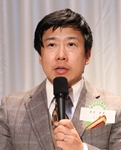Trend of Companies Dealing with Work-Life Balance
October 16, 2013
Mr. Naoki Atsumi
Toray Corporate Business Research, Inc.
Diversity and Work-Life Balance Research Department
Director and Chief Consultant
�� I conduct extensive research on how each company is trying to achieve ��work-life balance�� that ��generates a synergistic effect between one��s quality of life and work.�� The phrase ��work-life balance�� has gained some currency in Japan. Based on the value that life forms the basis of work, it addresses various issues including declining birth rate, employment and labor, social security as well as women��s participation in society.
I conduct extensive research on how each company is trying to achieve ��work-life balance�� that ��generates a synergistic effect between one��s quality of life and work.�� The phrase ��work-life balance�� has gained some currency in Japan. Based on the value that life forms the basis of work, it addresses various issues including declining birth rate, employment and labor, social security as well as women��s participation in society.
��I realized that how to balance work with nursing-care is becoming a serious business challenge today, through the hearings I have conducted with about 800 advanced companies both in Japan and overseas as well as data analysis of 3,000 companies. An increasing number of workers in all types of employment will need to handle both nursing-care and work in the days ahead and therefore, every company is encouraged to incorporate ��life-work balance�� into its risk management scheme.
��In my own life, I have been looking after my father for 4 years and struggled to leave work on time. My experience taught me that when you have no choice but to work within a set time-frame, your business-efficiency improves and eventually leads to increased productivity.
��As we all know, labor population in Japan will decrease to two-thirds in just 50 years. Japan is a depopulating society at a speed unprecedented worldwide. In such a tight labor market, each company must attract capable people by providing working conditions that promise greater job satisfaction.
��Actually, the workforce constitutes about 50% of the total population in Japan and it has not changed for the past 50 years and it is not expected to change for the next 50 years. What has changed dramatically, however, is its composition. Housewives used to account for a significant proportion of the non-working population, who had taken care of the elderly and children. In Japan, however, double-income households today outnumbered the one-breadwinner households that were usual over 20 years ago. This means working parents who undertake nursing-care at the same time will keep increasing in number and will become the mainstream. Sharing my own story, my wife is a full-time worker in the foreign-affiliated IT business and we have been undertaking nursing-care and child-rearing together in my family.
��Today, 5.7 million people engage in nursing-care in Japan, of which 2.9 million people are working at the same time. 1.7 million workers are in their 40s and 50s, and male workers account for 40% of them. As we focus on 80,000 manager level workers engaged in nursing-care, 80% are male workers. We must not forget that each year, about 100,000 employees are obliged to quit their job for nursing-care, and its growth rate for males is double the speed of females. These data indicate that male workers who need to undertake nursing-care will keep increasing in the future.
��Baby boomers will reach age 75 or over in 10 to 15 years and the number of elderly who require long-term care will show rapid increase accordingly. The number of workers who need to provide care to their aged family members is estimated to double in 10 years, to account for 20 % of all employees. Each company, therefore, has to prepare for such new business challenges to balance work with nursing-care or child-rearing.
��Let me propose the ��three Ps�� that address the needs of those working with restrictions caused by family duties. The first ��P�� is ��process innovation�� that raises one��s operational efficiency to overcome restrictions. The second ��P�� is ��product innovation�� that adds value to the existing products and services that meet consumer needs. Not a few female employees have actually developed hit products, including the automatic light-control appliance by Panasonic. The last ��P�� is ��parallel career�� that makes a balance between one��s vocational and family life career.
��In my personal life, I went through some difficult times. As I mentioned, I have been taking care of my father suffering from dementia and schizophrenia, while looking after my two children. The most challenging time for me was when my younger child was diagnosed with a brain tumor at age one and a half and underwent a major surgery that lasted for seven hours. My son is now three years old and he takes anticancer drugs to fight disease at such a young age. My personal experience taught me that to ensure ��life-work balance�� means to provide a working environment that gives all workers, both male and female whether in nursing-care or child-rearing, greater job satisfaction.
��We all encounter some unfavorable events in our lifetime. Someone in your family or workplace may be facing an obstacle in his/her life and having a hard time. By giving them a supportive push can change their life from hardship to happiness. My personal experience taught me that true happiness lies in sharing both the good times and bad times with your close family, friends and colleagues.
��Before closing, let me pay my sincere respect to you all gathered here today who are active in the front lines of the Japanese society. As you reinforce efforts to achieve ��work-life balance�� both at your workplace and home, I believe it will lead to a further development of the Japanese economy.